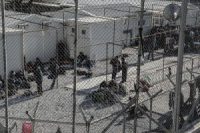COVID-19 further aggravates the already vulnerable situation of migrants and refugees held in hotspots and detention facilities in Greece, Italy and Spain.
In the Italian island of Lampedusa, migrants rescued at sea were left for days on the quayside waiting to be transferred to the peninsula because the hotspot was full. The National Guarantor for the rights of detained persons in Italy, together with the NGO Sea-Watch, expressed their deepest concern on the situation. Following the “Place of Safety” decree of 7 April and the communication of the Italian Civil Protection Unit on 12 April, Italy has decided to create “quarantine boats”, i.e. floating hotspots for migrants rescued at sea by Search and Rescue NGOs.
Malta has adopted a similar approach by closing its ports and declaring them unsafe. The country also started detaining migrants rescued at sea on two boats offshore, just outside its territorial waters. In the other “door of Europe”, Melilla, 600 Tunisians are at risk of deportation in a congested temporary immigration reception centre denounced by Spanish and Tunisian organisations.
Protests have sparked off in immigration detention facilities in France, Tunisia and Cyprus, where no distancing and hygiene measures have been taken. Organisations in Bulgaria denounce the arbitrariness for lawyers and other external visitors to access detention and reception centres. In Hungary, at the Serbian border, between 350 and 400 asylum seekers – most of them children or unaccompanied minors – are detained in a “transit zone”. Such detention was declared unlawful and amounting to a “deprivation of liberty” in a recent decision by the Court of Justice of the European Union.
Various appeals for the immediate release of migrant detainees have been raised across the Euro-Mediterranean region. In Belgium, lawyers and civil society organisations (CSOs) asked for the release of all migrants from detention centres. The impossibility to carry out returns amid the pandemic has led CSOs to call for a total closure of the centres, as happened in Spain. In Greece, CSOs have raised serious concerns on the recent law amending asylum legislation which includes the possibility to generalise detention measures.
The European Parliament, intergovernmental organisations and various United Nations (UN) agencies have also mobilised. The pandemic risks worsening the human rights situation in detention facilities, stressed Members of the European Parliament’s Subcommittee on Human Rights. Both the UN and Council of Europe Commissioners for Human Rights called on governments to “release immigration detainees”. UN experts stated that COVID-19 could not be used as an “excuse for unlawful deprivation of liberty”. In a policy brief, the UN Migration Network Working Group on Alternatives to Immigration Detention asked governments to stop new detentions and release people currently held.

